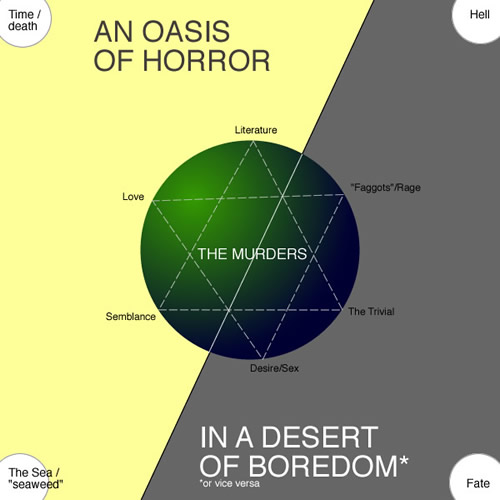
This makes sense to me, even though I feel like I'm still leaving out a whole bunch, and even though it might not make any sense to anyone else.
I don't think it is a great novel, although I think its strongest point is creating an internal logic so full that it approaches madness. I think the book lacks some basic things like joy, humor (there was humor, but not the type of humor that sustains one in the act of reading), and characterization. The people in the book seem flat and do not develop; they are almost like chess pieces Bolaño uses to illustrate his points. On the plus side, the book is unlike any other book I've read and its strengths are very different from those that I'm used to. I feel that this is a very difficult book to think about in terms of "good" or "bad". I honestly did not enjoy reading most of it, but I did feel compelled to continue. There is a sense that I am not immersed in the novel's world, but am only reading a synopsis of 'what happens', almost like reading a list of ingredients. There is something enticing about lists to me, perhaps that's why I kept reading.
2666 Group Read Experience:
I was excited to read 2666 partially because of the Group Read aspect. I like that there is not one forum for discussion, but rather everyone uses their own modes (whether it be twitter, blogs, forums, GoodReads, etc.). But while I found a lot of interesting perspectives, the book seems so open-ended that I started to not really get too much out of these perspectives, but instead felt an overwhelming sense of becoming a book-hermit. This book especially, while going outward, has a spiraling down and inwards feeling to me, akin to becoming slightly insane and illogical. What I didn't expect was that I liked not explaining or reading others explanations the more I got into the book, and felt a sense of guardedness towards the experience of reading rather than an expansion outwards. My gut feeling is that this would have been different with another book. I can't explain why. I remember after finishing The Brothers Karamazov, that I wished to discuss it with people. But with this book, I didn't have that feeling at all. Partly, I think any discussion of this book—which seems to have an infinite number of nodes for making connections—would be at least 80% bullshit, but maybe that's the cynic in me speaking.

No comments:
Post a Comment